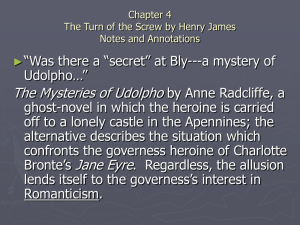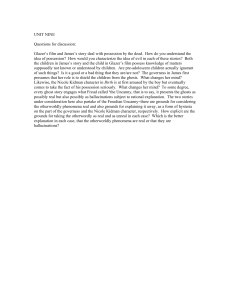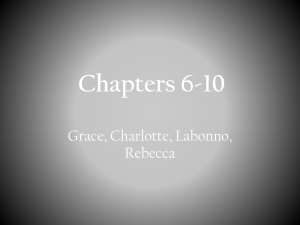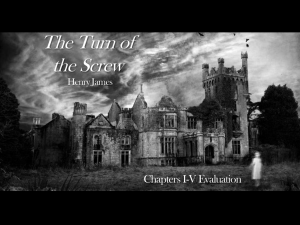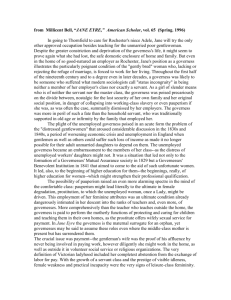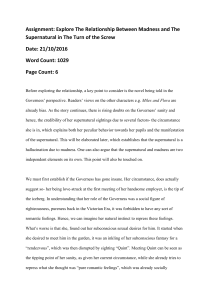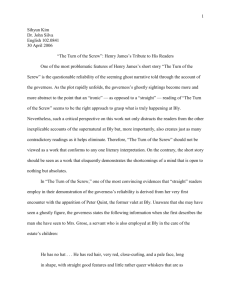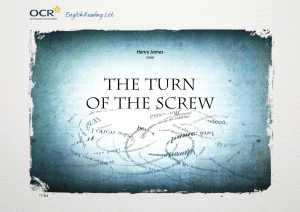Ghost vs. Hallucination
advertisement
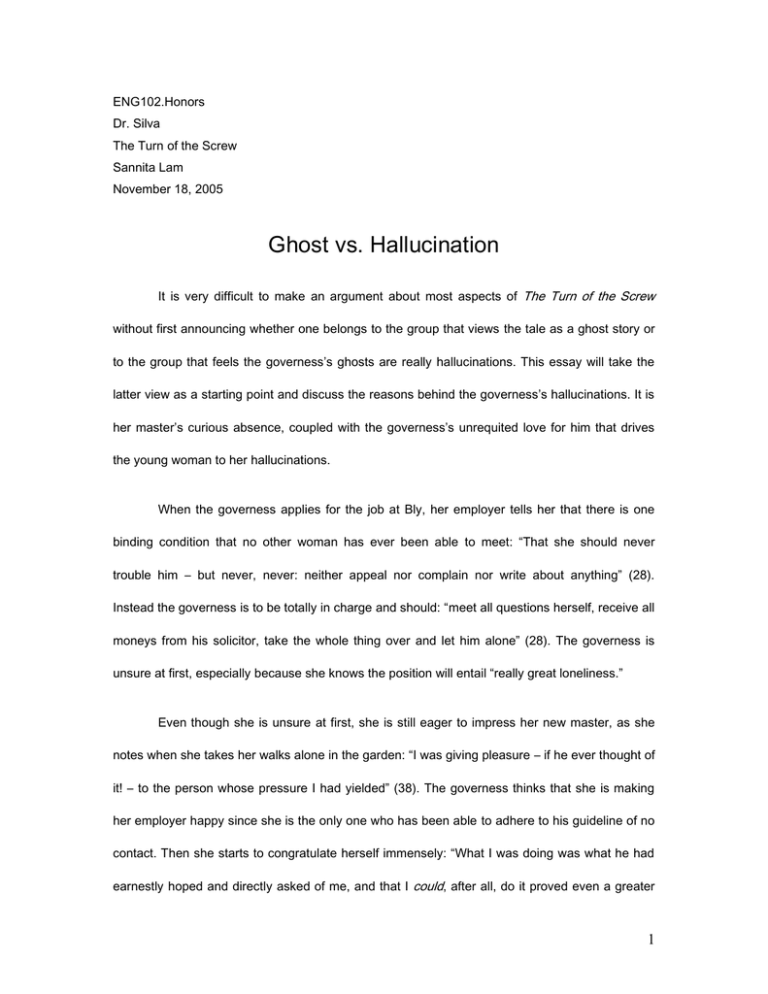
ENG102.Honors Dr. Silva The Turn of the Screw Sannita Lam November 18, 2005 Ghost vs. Hallucination It is very difficult to make an argument about most aspects of The Turn of the Screw without first announcing whether one belongs to the group that views the tale as a ghost story or to the group that feels the governess’s ghosts are really hallucinations. This essay will take the latter view as a starting point and discuss the reasons behind the governess’s hallucinations. It is her master’s curious absence, coupled with the governess’s unrequited love for him that drives the young woman to her hallucinations. When the governess applies for the job at Bly, her employer tells her that there is one binding condition that no other woman has ever been able to meet: “That she should never trouble him – but never, never: neither appeal nor complain nor write about anything” (28). Instead the governess is to be totally in charge and should: “meet all questions herself, receive all moneys from his solicitor, take the whole thing over and let him alone” (28). The governess is unsure at first, especially because she knows the position will entail “really great loneliness.” Even though she is unsure at first, she is still eager to impress her new master, as she notes when she takes her walks alone in the garden: “I was giving pleasure – if he ever thought of it! – to the person whose pressure I had yielded” (38). The governess thinks that she is making her employer happy since she is the only one who has been able to adhere to his guideline of no contact. Then she starts to congratulate herself immensely: “What I was doing was what he had earnestly hoped and directly asked of me, and that I could, after all, do it proved even a greater 1 joy than I had expected” (38). All of this shows that, in this frame of mind, she is starting to have a romantic daydream. The governess is imagining that her master will appear so that she can see his approval “in his handsome face” (39). However, her imagination that appears before the woman on the tower is not the one she expects – “the man who met my eyes was not the person I had precipitately supposed” (39). Maybe her conscious mind is asking for the appearance of the master so that she could show him how good she is and perhaps be rewarded. In her mind, the governess is creating a challenge for herself, something that is greater than merely following the master’s orders – her ghostly vision. It is not her love for her master alone that creates the governess’s hallucinations. When the children are prying into the governess’s background, she notes that they are trying to dig out “many particulars of the whimsical1 bent of my father” (79). There, the governess could be saying that her father is insane. If this is the case, then romantic daydreams about her master may have taped into some genetic madness that she inherited from her father. As the story goes on, the governess does start to appear a little crazy. She imagines that the children – under the influence of the ghosts – are plotting against her: “It was not, I am as sure to-day as I was sure then, my mere infernal2 imagination: it was absolutely traceable that they were aware of my predicament” (78). In this instance the governess believes that her tactful but vague allusions to the ghosts are being ignored by the children. In all reality, the children are probably confused as to what the governess is referring, or if they do understand her, they may think her mad, too. 1 Whimsical: acting or behaving in a capricious manner. 2 Infernal: relating to lower world of the dead. 2 Regardless of what the children think, they suffer as a result of the governess’s delusions. She watches them constantly, and on certain occasions, seems ready to give in to a mad rage, as when she thinks Flora’s keeping something from her. “At that moment, in the state of my nerves, I absolutely believed she lied” (69) and the hint of violence is soon made real: “… if I once more closed my eyes it was before the dazzle of the three or four possible ways in which I might take this up” (69). The governess mental state then rapidly deteriorating, and she can barely constrain herself from doing something harmful to the children: “… for a moment tempted me with such singular force that, to resist it, I must have gripped my little girl with a spasm… why not break out at her on the spot and have it all over?” (69). Even if another person were able to verify a ghost sighting, then perhaps, this statement could be refuted. The governess gets her chance near the end of the story, when she sees the ghosts of Miss Jessel while she is standing with Mrs. Grose and Flora. Right then, the governess is happy that somebody else will be able to testify as to the ghosts’ existence. The governess insists, “She was there, and I was justified; she was there, and I was neither cruel nor mad” (101). Unfortunately, Mrs. Grose sees nothing. This essay has shown, the governess is cruel and likely mad. She has been cruel with the children with her psychological torture, driving one into hysteria and one into the grave. And she is certainly displaying the signs of one who is mentally deranged and sexually repressed. Perhaps, when the ghost of Peter Quint disappears at the end of the story, her subconscious mind has declared herself a winner and claims triumph with her exclamations to Miles – “I have you… but he has lost you for ever!” (120). In conclusion, The Turn of the Screw is not a “real” ghost story, but a story about a woman who was having a delusion about seeing ghosts. 3

